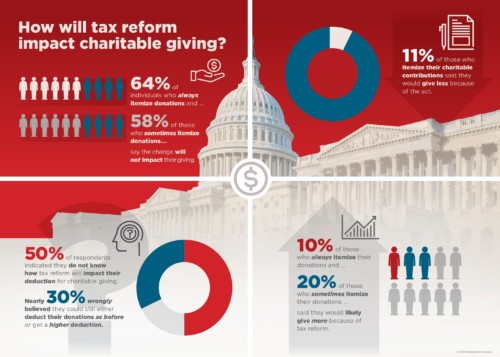A just-released study of American donors commissioned by Dunham+Company and conducted by research firm Campbell Rinker found that 59 percent of donors expect the recent tax reform (Tax Cuts and Jobs Act of 2017) to have no negative impact on their 2018 giving.
Many in the charitable sector have expressed concern over the negative impact the Tax Cuts and Jobs Act of 2017 could have on giving. The Act nearly doubles the standard deduction (to $12,000 from $6,350 for singles, and $24,000 from $12,700 for joint filers) thus eliminating the need to itemize for many donors.
More than half of those who always or sometimes itemize (64 percent and 58 percent, respectively), felt the change in the ability to deduct their charitable contributions would not negatively affect their 2018 giving.
Only eight percent of donors overall – and 11 percent of those who always itemize – said they will give less because of the tax changes. On the other hand, 20 percent of those who sometimes itemize and 10 percent of those who always itemize said they would most likely give MORE in 2018 despite the changes in the tax laws.
The study also found widespread public misunderstanding of how the recently enacted tax reforms affect charitable giving. Fully half of donors (50 percent) said they didn’t know how tax reform would impact the deduction for charitable giving. Nearly three in ten wrongly believed that they could either deduct their donations as before (19 percent) or even get a higher deduction (10 percent).
Interestingly, the study found giving likelihood remained the same regardless of the respondents’ political inclinations – self-described liberals were just as likely to consider giving more or be unaffected by the new tax law as self-described conservatives or moderates.
Of the donors surveyed, 59 percent always or sometimes itemize their charitable deductions. This proportion jumps to 74 percent for households making $75,000 or more. Among these higher income households, 43 percent didn’t know how tax reform would impact the charitable tax deduction, and another 28 percent believed it would not affect the deduction at all or would allow donors to take a higher deduction. By this measure, nearly three-quarters of higher income donors (71 percent) thought tax reform would have no adverse effect on their giving.
On learning that tax reform meant losing the ability to deduct charitable gifts, 10 percent of higher earners said they would give less, 9 percent said they would give more, 50 percent said their giving would be unchanged, and 32 percent didn’t know.
“In looking at the research, it seems that the overwhelming majority of donors really don’t understand how the Tax Cuts and Jobs Act of 2017 will impact their ability to deduct their charitable donations this year,” says Rick Dunham, CEO of Dunham+Company, a global marketing and fundraising consultancy to charitable institutions. “As a result, I actually think the data suggests that giving in 2018 really won’t be impacted much by tax reform. However, once people do their taxes for 2018 and realize there is no advantage to itemizing, then it could have an impact on charitable giving in subsequent years.”
Those who didn’t know how the new tax law affects charitable donations included 40 percent of those who ‘always’ itemize charitable deductions, and 39 percent of people who ‘sometimes’ do so.
A quarter of consistent itemizers (23 percent) believe the tax rules regarding charitable deductions haven’t changed. In addition, nearly two in ten occasional itemizers (19 percent) believe the tax rules on charitable deductions are now more lenient, and one in ten consistent itemizers say the same (9 percent).
Campbell Rinker conducted the online study in September 2018 among 501 American donors who gave at least $25 outside a church or house of worship in the previous year. This sample delivers an overall margin of error of ±4.38% at the 95% confidence level.

 Read the latest article from Rick Dunham, Dunham+Company CEO, titled ‘Will Holiday Giving Be Full of Cheer?’
Read the latest article from Rick Dunham, Dunham+Company CEO, titled ‘Will Holiday Giving Be Full of Cheer?’